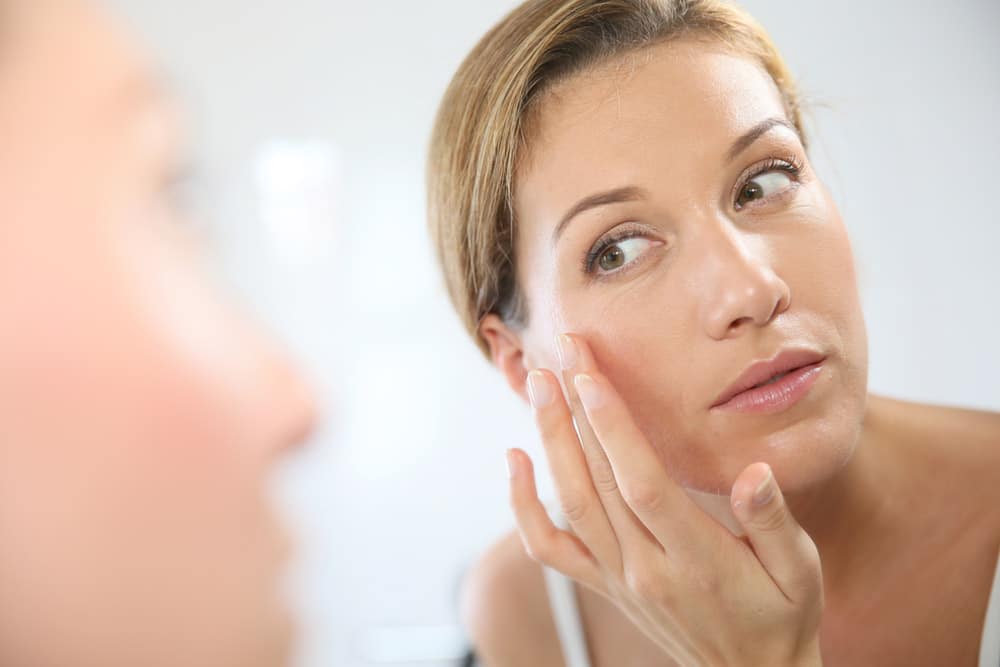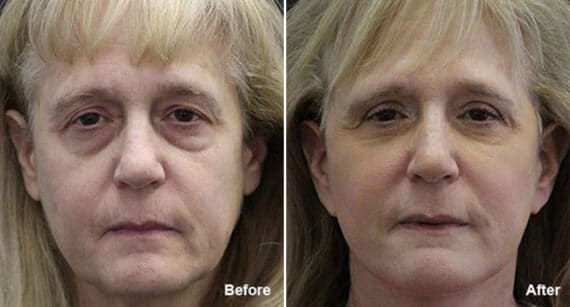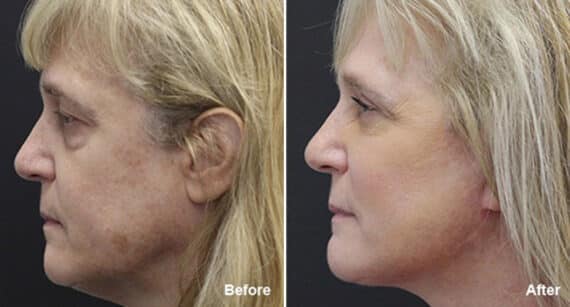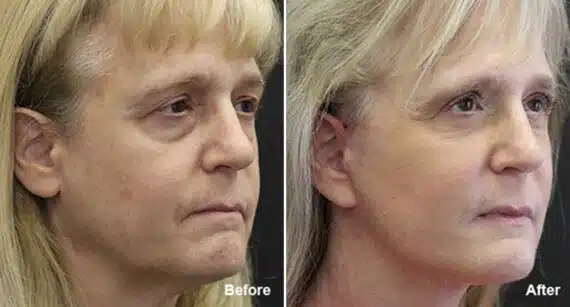If you had a facelift and still see swelling, that is normal. Swelling forms a part of the healing process – it takes time for the area to fully settle. This feels frustrating, but simple, proven ways help reduce the swelling more comfortably.
In this guide, we’ll walk you through how to reduce swelling after facelift surgery, step by step. These are practical tips used every day by the expert plastic surgeons at Becker Plastic Surgery to support smooth, safe recovery for their patients.
Healing takes time. The right care helps your body, and you will begin to see the renewed results you want.

Managing Post-Facelift Swelling
- Follow your surgeon’s instructions to help reduce swelling and avoid complications.
- Stay hydrated and eat a low-sodium, nutrient-rich diet to support healing.
- Rest as much as possible and avoid heavy lifting or intense activity.
- Use cold compresses during the first 48 hours to ease inflammation.
- Sleep with your head elevated to help drain fluid and minimize swelling.
Understanding Facelift Surgery and Post-Procedure Implications
A facelift is a major procedure. It is normal to feel unsure about what happens afterward. Swelling after surgery is expected- it shows that your body heals. The duration of swelling depends on your general health and the type of surgery you had; it also depends on how closely you follow your recovery plan.
Swelling is normal; however, you must watch your healing. If the swelling does not lessen or worsen, this shows a complication. This could be an infection or slow healing. If something feels wrong, do not wait. Talk to your surgeon for help.
Most facelift complications are rare, but they can happen. For example, hematomas occur in about 0.6% to 14.2% of cases and should be treated quickly to avoid serious issues like airway obstruction. Less common complications, like skin sloughing or infection, are much less likely today thanks to advanced surgical techniques.
How To Reduce Swelling After a Facelift
Reducing swelling helps you heal better and get the best results from your surgery. Taking the right steps during recovery can lower the chance of scars and give you a nicer look. Just remember, it takes time. Being patient and taking good care of yourself makes all the difference in your facelift procedure.
Facelift Patient Results
* All patients are unique and individual results may vary.
Tip 1: Follow Your Surgeon’s Instructions to Reduce Swelling
The surgeon’s instructions show a patient how to recover smoothly and safely. These instructions are not just helpful tips, they are personal directions, as they lessen swelling and stop problems such as infection or scars. And, help the patient heal well.
Take medications as prescribed. Care for incisions and dressings. Avoid some activities. People often have questions during recovery, so ask if something is unclear or feels wrong. Contacting your surgeon helps your results.
Following these guidelines closely helps ensure your healing goes as expected and that your final results look and feel just right.
Tip 2: Proper Hydration and Balanced Diet
After a facelift, drinking enough water and eating varied foods helps your body heal. These simple habits reduce swelling; they also speed recovery and improve your comfort as you heal.
Here’s what helps most:
- Drink water regularly throughout the day. Keeping a water bottle nearby is a helpful reminder.
- Focus on nutrient-rich foods like:
- Fresh fruits and vegetables
- Whole grains
- Lean proteins (such as chicken or fish)
- Low-fat dairy
These foods offer vitamins, minerals, along protein. Your body uses these to repair tissue and lower inflammation.
Do not eat salty foods. Do not consume too much caffeine. Both cause your body to hold water plus slow your recovery.

Tip 3: Adequate Rest and Avoidance of Strenuous Activities
Rest plays a major part in recovery, especially during the first week after a facelift. Pushing yourself too soon expands swelling and it may cause bleeding and slow progress.
Avoid physically demanding activities like heavy lifting or intense workouts. Allow your body time to recover. You can take gentle walks, even just around the house. This helps keep your blood flowing and lessens the chance of clots, and also puts no strain on your healing tissues.
As days pass, move into activity slowly. Always pay attention to your body and follow the advice from your surgeon. Finding the right balance between rest and light movement helps a smoother, safer recovery.
Tip 4: Use Cold Compresses Within 48 Hours to Control Swelling
Cold compresses work well to lessen swelling and fluid after a facelift. This proves true during the first one or two days. The cold shrinks small blood vessels and slows blood flow to the area; it also eases inflammation.
Gel ice packs are a good choice because they’re soft and can conform to delicate areas around the face. To use them safely:
- Wrap the pack in a thin towel or cloth—never apply ice directly to your skin.
- Set it softly on the puffy area for 20 minutes, then take it off so your skin can rest.
- Repeat several times a day during the early recovery phase.
For the first few days, use cold compresses regularly. This approach helps the recovery feel more comfortable and reduces the swelling more quickly. If your skin shows irritation or feels too cold, stop using the compress. Contact your surgeon for advice.
Have more questions about facelift?
Schedule an appointment with our experts in New Jersey and Philadelphia.
Tip 5: Follow Medication Guidelines and Avoid Blood Thinners
After a facelift, medications help manage pain and prevent infection. But they can also affect swelling if someone does not use them correctly. Always follow your surgeon’s instructions closely. Do not adjust your medications without medical guidance.
Blood-thinning medications and supplements are often overlooked factors; they can increase bruising and cause swelling to last longer. Do not use them unless your surgeon approves them. Avoid:
- Aspirin
- Ibuprofen (Advil, Motrin)
- Fish oil
- Vitamin E
- Herbal remedies like ginkgo or garlic
Also, eat a heart-healthy, low-sodium diet to support stable blood pressure, since high blood pressure can worsen inflammation and slow recovery.
If you’re unsure whether something you’re taking could interfere with healing, check with your healthcare provider. Being cautious with medications and supplements is one of the simplest ways to reduce swelling and avoid complications.
Tip 6: Take Gentle Care of Your Skin to Support Healing
Proper skin care matters for healing, as it helps you keep the look you gained with surgery. The following tips help you care for your skin after surgery:
- Follow your surgeon’s skincare instructions carefully. These instructions usually cover gentle cleansing, moisturizing, along the application of any healing products the surgeon recommends. Do not skip steps, and do not substitute products unless a doctor approves it.
- Protect your skin from the sun. Sunlight hurts skin as it heals and this affects results. Put on a broad-spectrum sunscreen with SPF 30 or more. Wear a wide-brimmed hat when you go outside, even on cloudy days.
- Be gentle with your skin. Do not rub, scrub, or pull the surgical areas. Irritation delays healing – it interferes with incision recovery. If you notice redness, tightness, or discomfort that seems unusual, contact your surgeon.
- Hold off on makeup until your surgeon says it’s safe. Putting on makeup too soon, especially on or near cuts, irritates the skin or causes infection. Most patients can use a little makeup after the first healing period. But always follow the surgeon’s schedule.
Treating your skin with extra care during this time helps ensure a smoother recovery and the best possible long-term results.

Tip 7: Maintaining an Elevated Position While Resting
Elevating your head after surgery, especially when you sleep, helps decrease swelling. This encourages fluid to drain from the surgical area – this drainage helps your body’s healing.
Place some pillows to raise your head and neck, or use a wedge pillow made for recovery after surgery. This position lowers swelling – it also eases pressure on your incisions, which lessens the chance of irritation and inflammation.
You might also find that sleeping elevated improves your breathing and makes you more comfortable during those early days of recovery.
Why Choose Becker Plastic Surgery for Your Facelift?
Becker Plastic Surgery is renowned for its personalized approach and excellent outcomes in cosmetic procedures. Here’s why patients trust us:
- Expert Surgeons: Our team, including Drs. Nicole Schrader, Joanna Kam, Kirk Lozada, Alisa Yamasaki, and Anni Wong, are leaders in the field, offering precise and careful attention to every detail.
- Patient-Focused: Your comfort, safety, and satisfaction are our top priorities, ensuring a supportive journey from consultation through recovery.
- Proven Results: We deliver consistently natural and rejuvenating results, tailored to your individual aesthetic goals.
- Trusted Reputation: Based in New Jersey and Philly, our practice is known for advanced techniques and expertise in the latest cosmetic enhancements.
Choose Becker Plastic Surgery for transformative results that reflect your desires.
Swelling after Surgery Timeline
- Days 1–3: Swelling is at its peak. You may also notice some tightness or bruising.
- Days 4–7: The swelling slowly reduces. Cold compresses help, and head elevation helps, too
- Week 2: Visible swelling continues to improve. Many patients feel comfortable returning to light social activities.
- Weeks 3–4: Most swelling and bruising went away. Makeup can cover any color left on the skin.
- Months 2–3: Subtle swelling may remain in deeper tissues but is usually not noticeable to others.
What Changes at Six Months
At the six-month mark, most patients experience these changes:
- Swelling: The major swelling is gone, and your refreshed facial contours are now more defined.
- Skin Sensation: The tissues settle and nerves heal, so any tightness from earlier in recovery usually goes away.
- Scars: Incisions look flatter and lighter in color, especially if you follow sun protection and scar care advice.
Most healing finishes by this point, but small changes may continue for up to a year. This slow progress is normal; it is part of your body’s natural healing.
The American Society of Plastic Surgeons states that patients who undergo a facelift report high satisfaction. Their results appear natural, their confidence improves, and their life quality increases.
Every person’s healing takes a different amount of time. If you feel unsure about your healing, speak with your surgeon.
When to be concerned about swelling after a facelift
After a facelift, some swelling is normal. You should know what looks typical and what does not. This helps you find a problem early.
You should contact your surgeon if you notice any of the following:
- Swelling that gets worse instead of better after the first few days
- New or increasing pain, especially if it’s sharp, persistent, or not relieved by medication
- One-sided swelling (only one cheek or side of the face)
- Redness or warmth around the incisions
- Skin that feels tight, shiny, or overly firm
- Drainage or pus from incision sites
- Fever over 100.4°F (38°C)
- Swelling accompanied by bruising that’s spreading rapidly
- Difficulty breathing or swallowing (seek emergency care)
Signs of problems include hematoma, infection, or fluid buildup. Doctors should check them quickly.
Trust your instincts. If something feels wrong, check with your surgeon. Early attention prevents small issues from growing into serious problems.
Consult with Experts in Facial Plastic Surgery
It’s important to keep in mind that the healing process varies for everyone. What is normal for one person may not be for another, so personalized care is essential. At Becker Plastic Surgery, we are here to help you on your recovery journey. If you are worried about your recovery, contact us. We can assist you with a smooth recovery so you can achieve the look you desire!


